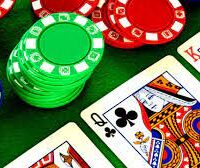When You Need Poker Goals

Poker is a game that requires skill, strategy, and discipline. It can be played for fun, but for those who take it seriously, setting goals is essential for success. Setting goals in poker helps to focus your efforts, track your progress, and ultimately improve your game. Here are some potential poker goals to consider:
- Increase Your Win Rate: One of the most important goals in poker is to increase your win rate. The win rate is the amount of money you make per hour of play. To increase your win rate, you need to improve your poker skills, including your hand reading, position play, bet sizing, and bluffing. You can also improve your win rate by selecting your opponents carefully and choosing games with weaker competition.
- Move Up in Stakes: Moving up in stakes is a natural goal for many poker players. When you feel confident in your game and your bankroll allows it, you can move up to higher stakes games. Higher stakes games often have tougher competition, but they also offer more significant rewards. Moving up in stakes is a significant milestone for many poker players, and it shows that you are progressing in your game.
- Achieve a Specific Bankroll: Another goal for many poker players is to achieve a specific bankroll. A bankroll is the amount of money you have set aside for playing poker. A specific bankroll goal can help you focus on building and maintaining a healthy poker bankroll. The size of your bankroll will depend on the stakes you play and the level of risk you are comfortable with.
- Improve Your Mental Game: The mental game is crucial in poker, and it can make a significant difference in your results. To improve your mental game, you need to work on your focus, emotional control, and decision-making skills. You can also work on your confidence and positivity, which can help you stay motivated during losing streaks and overcome tilt.
- Master a New Variant: Poker has many different variants, including Texas Hold’em, Omaha, Stud, and more. Mastering a new variant can be an exciting goal for poker players. It allows you to expand your skills and experience new challenges. You can start by learning the rules and basic strategy of the new variant, then gradually practice and refine your skills.
- Win a Specific Tournament: Winning a poker tournament can be a significant achievement for many players. Setting a goal to win a specific tournament can motivate you to work harder on your game and prepare for the event. You can research the tournament, its structure, and its competitors to develop a winning strategy.
- Develop a Poker Network: Building a network of poker players can be beneficial for your game. You can share knowledge, discuss hands, and learn from each other’s experiences. Developing a poker network can be a goal for players who want to expand their social circle and improve their game.
- Participate in Live Events: Live poker events offer a unique experience for players. They allow you to meet other players, compete against top-level competition, and experience the excitement of a live game. Participating in live events can be a goal for players who want to challenge themselves and take their game to the next level.
- Improve Your Physical Health: Physical health can affect mental performance, and poker is no exception. Improving your physical health can help you stay focused, make better decisions, and handle stress more effectively. Setting a goal to exercise regularly, eat healthily, and get enough rest can benefit your overall well-being and your game.
- Maintain a Balanced Lifestyle: Poker can be a demanding game, and it’s essential to maintain a balanced lifestyle. Setting a goal to balance your poker game with other aspects of your life, such as work, family, and hobbies, can help you avoid burnout and maintain a healthy perspective on the game. This means setting boundaries, managing your time effectively, and knowing when to take a break.
- Give Back to the Poker Community: Giving back to the poker community can be a rewarding goal for players who want to make a positive impact. You can volunteer at local poker clubs, mentor new players, or donate to charity poker events. Contributing to the community can help you feel more connected to the game and give you a sense of purpose.
- Become a Professional Player: Becoming a professional poker player is a significant goal for many players. It requires dedication, discipline, and a deep understanding of the game. To become a professional, you need to develop your skills, build your bankroll, and manage your finances effectively. You also need to be prepared for the ups and downs of the game and have a solid backup plan.
Setting goals in poker can help you stay motivated, focused, and committed to improving your game. Whether your goal is to increase your win rate, move up in stakes, or become a professional player, it’s important to set realistic and achievable targets. Remember to track your progress, celebrate your successes, and learn from your mistakes along the way. With dedication and perseverance, you can achieve your poker goals and reach new heights in the game.





